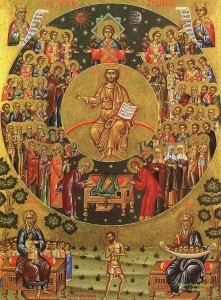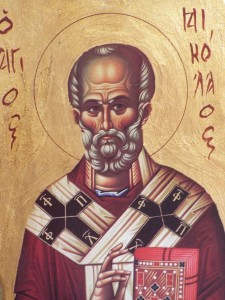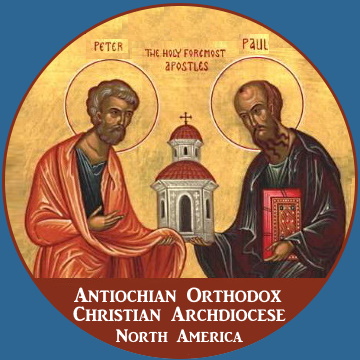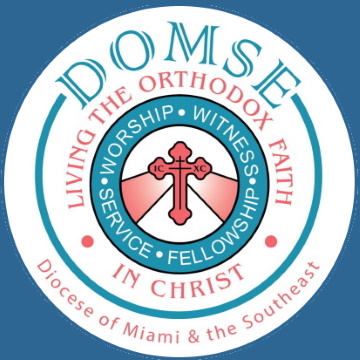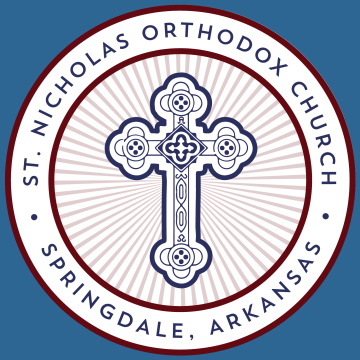Living An Orthodox Life
As St Paul told us the purpose of the Christian life is attaining the fullness of Christ, through living in a sacramental community with our brothers and sisters, as directed by the leaders that the Holy Spirit has given us (Ephesians 4).
 We do not seek any righteousness outside the Body of Christ but we strive to become holy within it. As our Lord Jesus taught, this holiness far exceeds the requirements of any externally imposed system whether that system be the Law of Moses, philosophical ethics, or rules for success (Matthew 5:20). We are called to attain the holiness of the Father and that holiness is expressed by never failing generosity, kindness, forgiveness, and love (Matthew 5:44-46 and 1 Peter 1:13-21).
We do not seek any righteousness outside the Body of Christ but we strive to become holy within it. As our Lord Jesus taught, this holiness far exceeds the requirements of any externally imposed system whether that system be the Law of Moses, philosophical ethics, or rules for success (Matthew 5:20). We are called to attain the holiness of the Father and that holiness is expressed by never failing generosity, kindness, forgiveness, and love (Matthew 5:44-46 and 1 Peter 1:13-21).
Since we are not trying to be ‘good enough’ to gain God’s favor but are trying to be ‘like’ God in His goodness, the Orthodox Church is less interested in ‘rules’ than in encouraging us to follow the example of those who have attained “the stature of the fullness of Christ” (Ephesians 4:13). This is the Biblical model as taught by St Paul and so Orthodox Christians learn how to become holy by imitating our Lord and Savior, other holy people in the Scriptures, the lives of the saints, and people in our own communities (1 Corinthians 4:13 ; 1 Corinthians 11:1 ; Philippians 3:17 ; Philippians 4:9 ; 1 Thessalonians 1:6 ; 2 Thessalonians 3:9 ; Hebrews 13:7). 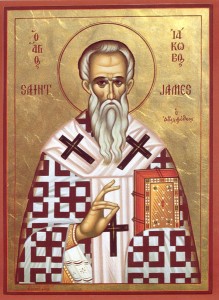 These models of Christian conduct, like our own patron St Nicholas, showed heroic love even though they were people of “like passions” as ourselves (Acts 14:15 and James 5:17). If they were able to become holy as our heavenly Father is holy, we can do so as well. Jesus would never command us to do the impossible (Matthew 5:48). We can rely on God’s grace and the support of the saints on earth and in heaven to become holy as He is holy.
These models of Christian conduct, like our own patron St Nicholas, showed heroic love even though they were people of “like passions” as ourselves (Acts 14:15 and James 5:17). If they were able to become holy as our heavenly Father is holy, we can do so as well. Jesus would never command us to do the impossible (Matthew 5:48). We can rely on God’s grace and the support of the saints on earth and in heaven to become holy as He is holy.
Becoming a holy person requires living in community with other people who share the same goal. An Orthodox Christian community, whether a parish or a monastery, is more like a large very diverse family than a small club. At St Nicholas, we do not all look or think alike. We do not share the same worldly interests or politics. We are at different physical and spiritual levels of maturity. We do not all have the same material resources. We have different natural talents. The Holy Spirit has given us different gifts. We are, however, children of the same Father, united in the same Son, by the power of the same Holy Spirit (John 1). This diversity is the strength of the Church but diversity requires love (1 Corinthians 13 and 1 John 4:7-12). Christians are called to have “one mind” but this does not mean that we are called to agree about everything because each human person is unique. St Paul explicitly told us that this oneness of mind reflects Christ’s humility in preferring to minister to the needs of His weak human brethren rather than insisting on His own ‘best interests’ (Philippians 2:1-8). For us to attain this humility requires a change of mind and heart.
Repentance (metanoia in Greek) means changing our thoughts and our actions but most 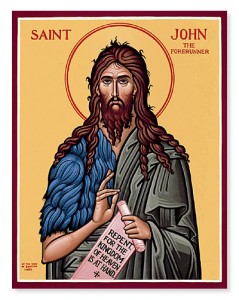 importantly it means changing our orientation from seeking our own best interests to seeking the will of God and the needs of the Body of Christ. The Scriptures and the lives of the saints give us innumerable instances of dramatic repentance like St Paul’s conversion on the road to Damascus (Acts 9:3-19). Ongoing repentance, however, is required if we are to become holy people living in communion with our brothers and sisters in the Body of Christ. In the Orthodox Church the demands of our common life and the requirements of individual repentance are harmonized by the pastoral ministry of our bishops.
importantly it means changing our orientation from seeking our own best interests to seeking the will of God and the needs of the Body of Christ. The Scriptures and the lives of the saints give us innumerable instances of dramatic repentance like St Paul’s conversion on the road to Damascus (Acts 9:3-19). Ongoing repentance, however, is required if we are to become holy people living in communion with our brothers and sisters in the Body of Christ. In the Orthodox Church the demands of our common life and the requirements of individual repentance are harmonized by the pastoral ministry of our bishops.
The most obvious expression of this episcopal pastoral ministry is in our order of services or typika. While every local Orthodox community has small differences in liturgical and musical expression, no Orthodox community invents forms of worship to suit its own needs. Each parish follows the instructions of its local bishop and does not pick and choose elements from various traditions according to its preferences. At St Nicholas, we follow the traditions of the Patriarchate of Antioch, as interpreted by our Archdiocese, and directed by the Diocese of Miami and the Southeast. Since all recognized Eastern Orthodox jurisdictions are in communion with each other in the United States, every jurisdiction in America recognizes the authenticity of the other jurisdictions’ liturgical traditions and has done so for centuries. This extends to matters of the Church calendar and liturgical commemorations as well.
A less obvious but equally important element of episcopal ministry is the application of the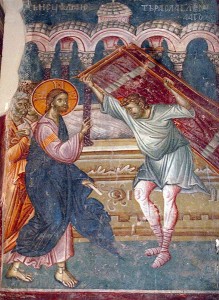 Canons of the Church. In practice, however, this spiritual fatherhood is shared by the bishops with the pastors of local parishes acting under their authority. The Canons are not the Orthodox equivalent of the Law of Moses. They are not really moral laws at all but spiritual medicines designed to cure sin, the sickness of the soul (Metropolitan Heirotheos, Hesychia and Theology, 2007, 167-180). As such the Canons are not to be applied by those who are not blessed by their local bishop to exercise pastoral ministry. As St Paul taught, morality whether Biblical or derived from philosophy is a good thing but it is unable to make a person holy (Romans 7 and Romans 8). The only purpose of the Canons is to heal the souls of those sickened by sin, in other words to make us holy as our heavenly Father is holy. Any other usage is, according to Metropolitan Heirotheos, a sign of legalistic secularism and a grave misunderstanding of the nature of the Christian life.
Canons of the Church. In practice, however, this spiritual fatherhood is shared by the bishops with the pastors of local parishes acting under their authority. The Canons are not the Orthodox equivalent of the Law of Moses. They are not really moral laws at all but spiritual medicines designed to cure sin, the sickness of the soul (Metropolitan Heirotheos, Hesychia and Theology, 2007, 167-180). As such the Canons are not to be applied by those who are not blessed by their local bishop to exercise pastoral ministry. As St Paul taught, morality whether Biblical or derived from philosophy is a good thing but it is unable to make a person holy (Romans 7 and Romans 8). The only purpose of the Canons is to heal the souls of those sickened by sin, in other words to make us holy as our heavenly Father is holy. Any other usage is, according to Metropolitan Heirotheos, a sign of legalistic secularism and a grave misunderstanding of the nature of the Christian life.
Fasting is a normal part of an Orthodox Christian life. Since the first century fasting on Wednesday and Friday was an expected part of that life. As the Church developed its yearly liturgical cycle, we began to have the opportunity of sharing seasons dedicated to repentance. Communal fasting was, of course, always part of those common seasons and it continues to be practiced at St Nicholas. Fasting, however, is a spiritual and not a merely bodily discipline. We do not become more Christ-like by eating healthy but expensive foods or by making ourselves sick by depriving ourselves of needed nourishment. Orthodox ‘fasting foods’ were originally the diet of the very poor. They were ‘humble’ foods that matched our seasons of repentance.
Fasting without forgiving our enemies, without increased prayer, and without sacrificing for the poor can be destructive to the spiritual life. This is emphasized in the liturgical prayers of the penitential seasons and in the ascetic writings of the saints. For these reasons, the Antiochian Archdiocese insists that the bodily discipline of fasting be accompanied by increased prayer and spiritual struggle under the supervision of a spiritual father. Fr. John will be happy to discuss the specifics of fasting and a rule of prayer either informally or within the sacrament of Confession. An excellent presentation by Fr. Ayman Kfouf on the meaning and history of fasting in the Orthodox Church may help prepare you for that discussion. It is available at The Lenten Fast: Its Rule and Spirit.
Our Lord Jesus’ answer to the rich young ruler sums up the Orthodox Christian teaching about morality (Luke 18:22 ; Mark 10:17-21 ; Matthew 19:16-21). Sexual activity outside marriage, murder, bearing false witness, and abortion are sins. We know these things and we honor the commandments but the commandments are not the ‘end’ or perfection of the life in Christ.Because of this, repentance and confession are the Church’s remedy for private sins.
 The absolute privacy of the sacrament of confession ensures that nothing should stand in the way of a repentant sinner. The Orthodox Church does not shame repentant sinners and it does not look to publicly discipline its members for private matters. Nonetheless, how Christians plan the major events of their lives is a public statement and every Orthodox jurisdiction in the United States does insist that Orthodox Christians who are planning a wedding receive the sacrament of Crowning and that funeral arrangements for Orthodox Christians reflect the Church’s teaching on the resurrection. If you are planning a wedding or pre-planning a funeral please discuss the matter with Fr. John to avoid any confusion.
The absolute privacy of the sacrament of confession ensures that nothing should stand in the way of a repentant sinner. The Orthodox Church does not shame repentant sinners and it does not look to publicly discipline its members for private matters. Nonetheless, how Christians plan the major events of their lives is a public statement and every Orthodox jurisdiction in the United States does insist that Orthodox Christians who are planning a wedding receive the sacrament of Crowning and that funeral arrangements for Orthodox Christians reflect the Church’s teaching on the resurrection. If you are planning a wedding or pre-planning a funeral please discuss the matter with Fr. John to avoid any confusion.
